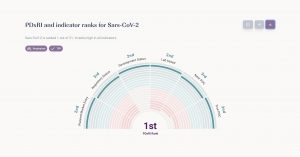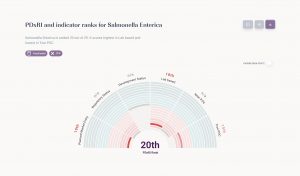Introducing the Pathogen Diagnostics Readiness Index (PDxRI)
To address the gaps in diagnostic preparedness, the Pathogen Diagnostics Readiness Index (PDxRI) was developed as a comprehensive tool to assess the global diagnostic landscape. Created by FIND and OneTandem, the PDxRI evaluates the availability of diagnostic tools for a range of pathogens known to cause outbreaks, epidemics, and pandemics.
The first iteration of the PDxRI covers 21 key pathogens, including familiar names like SARS-CoV-2, Ebola, Mpox, and others. It provides insights into which diagnostic tools are suitable for various healthcare settings, their regulatory status, and the availability of target product profiles (TPPs).
As an example SARS-CoV-2 is scoring high and Salmonella Enterica low.

The tool aims to:
The PDxRI plays an invaluable role in improving diagnostic access and epidemic preparedness by offering evidence-based insights that guide decision-making. It identifies where diagnostic tools are lacking and helps public health officials, policymakers, researchers, and diagnostic developers prioritize resources, ensuring that health systems are better equipped to handle future outbreaks.
Praesens Care’s Commitment to Diagnostic Access and Epidemic Preparedness
The Pathogen Diagnostics Readiness Index (PDxRI) offers valuable insights into gaps in the availability of diagnostic products for critical pathogens. At Praesens Care, we align our mission with these insights as we are dedicated to improving diagnostic access and strengthening epidemic preparedness by designing, building, and deploying mobile medical laboratories equipped with essential diagnostic tools.
Our mobile labs are designed and equipped to test for all 21 pathogens on the PDxRI, addressing the gaps identified in diagnostic products, particularly between laboratory-based tests and point-of-care (POC) tests. While many diagnostics score well in the "lab-based" category, they often fall short in true POC settings, where rapid, accessible testing is crucial. With our mobile labs, we can also bring these laboratory-based diagnostics to the point of care, effectively bridging this significant gap.
This allows us to offer high-quality, lab-grade testing for all of the 21 pathogens in a decentralized, field-ready manner, independent if they score high or low on POC. By providing real-time, on-site testing in underserved or remote areas, we ensure faster detection, intervention, and containment of diseases. This integration of lab-based diagnostics into POC environments helps fill a critical gap in epidemic preparedness, bringing essential tools to regions where healthcare infrastructure is limited.
The PDxRI serves as a key framework that informs our approach. By revealing which pathogens are in greatest need of diagnostics and identifying gaps in the diagnostic landscape, the PDxRI enables us to plan our deployments effectively. By matching our deployments with the needs revealed by the PDxRI, we enhance epidemic preparedness by delivering the necessary diagnostics to communities that would otherwise lack access, ultimately strengthening health systems and preventing the uncontrolled spread of infectious diseases.
Praesens Care remains committed to working alongside health authorities and diagnostic experts to enhance diagnostic access and improve epidemic preparedness worldwide. Our innovative mobile solutions help ensure that even the hardest-to-reach locations have access to the diagnostics they need to respond quickly and effectively to emerging health threats.
https://www.finddx.org/data-and-impact/dashboards/diagnostic-readiness-index/#/